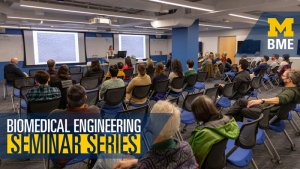Presented By: Biomedical Engineering
Biomedical Engineering Seminar Series
Multiscale Control of Dynamic Hydrogels for Biomedical Applications, with Adrianne M. Rosales, Ph.D.

Abstract:
Engineered extracellular matrices (ECMs) are important for cellular therapies and tissue engineering applications; however, synthetic ECMs remain less structurally and biologically complex than natural ECM. In particular, the native ECM is composed of hierarchically structured biopolymers with dynamic properties that change over time. Synthetic ECMs, however, are typically formed from disordered polymers and chemistries that lead to time-invariant properties. Toward this end, we have developed bioinspired strategies to incorporate hierarchical order and dynamic behavior into synthetic hydrogels. We will discuss the chemical and physical mechanisms that lead to multiscale control in these materials, as well as their application toward matrices for human mesenchymal stromal cell culture.
Bio:
Dr. Adrianne Rosales is an Assistant Professor of Chemical Engineering at the University of Texas at Austin. She is a co-lead of the Interdisciplinary Research Group “Fuel-Driven Pluripotent Materials” in UT Austin’s Materials Research Science and Engineering Center. She received her B.S. in Chemical Engineering from UT Austin and obtained her Ph.D. in Chemical Engineering from UC Berkeley. After completing her Ph.D. in 2013, she trained at the University of Colorado Boulder as an NIH NRSA post-doctoral fellow. Adrianne's group at UT Austin focuses on the development of bioinspired polymeric materials to model cellular microenvironments and engineer therapeutic technologies. This work has received emerging investigator recognitions from the Burroughs Wellcome Fund, the NIH, the NSF, and the American Chemical Society Polymeric Materials: Science and Engineering Division.
Zoom:
https://umich.zoom.us/j/99085426766
Engineered extracellular matrices (ECMs) are important for cellular therapies and tissue engineering applications; however, synthetic ECMs remain less structurally and biologically complex than natural ECM. In particular, the native ECM is composed of hierarchically structured biopolymers with dynamic properties that change over time. Synthetic ECMs, however, are typically formed from disordered polymers and chemistries that lead to time-invariant properties. Toward this end, we have developed bioinspired strategies to incorporate hierarchical order and dynamic behavior into synthetic hydrogels. We will discuss the chemical and physical mechanisms that lead to multiscale control in these materials, as well as their application toward matrices for human mesenchymal stromal cell culture.
Bio:
Dr. Adrianne Rosales is an Assistant Professor of Chemical Engineering at the University of Texas at Austin. She is a co-lead of the Interdisciplinary Research Group “Fuel-Driven Pluripotent Materials” in UT Austin’s Materials Research Science and Engineering Center. She received her B.S. in Chemical Engineering from UT Austin and obtained her Ph.D. in Chemical Engineering from UC Berkeley. After completing her Ph.D. in 2013, she trained at the University of Colorado Boulder as an NIH NRSA post-doctoral fellow. Adrianne's group at UT Austin focuses on the development of bioinspired polymeric materials to model cellular microenvironments and engineer therapeutic technologies. This work has received emerging investigator recognitions from the Burroughs Wellcome Fund, the NIH, the NSF, and the American Chemical Society Polymeric Materials: Science and Engineering Division.
Zoom:
https://umich.zoom.us/j/99085426766